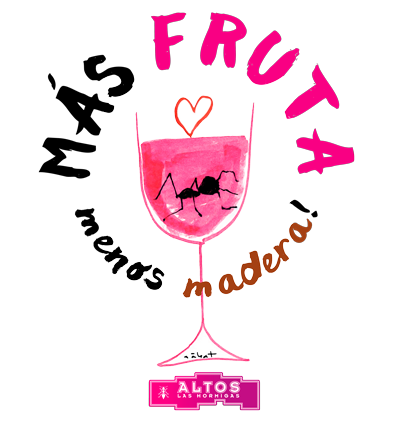Here at ALH we believe in a certain way of winemaking: listen to the grapes and follow them on their personal and beautiful journey to become wine. We choose our grapes plot-by-plot, and we work individually with each batch of grapes, in its own tank, its own personality.

Every day, twice a day, we taste each tank and we decide what work needs to be done in the next 8 hours. Each tank is an individual, a world of its own. Its characteristics depend on what time it came in, the temperature it came in, what block of the vineyard it came from, the size of the tank, the way the tank was filled… and therefore each tank needs to be made in its own way. Each tank needs to be closely followed in order to understand each step it takes along its journey.
We affectionately call it “dialogue winemaking” where winemaker and tank should talk to each other and listen, at all times.

Our goal is to pursue an authentic terroir expression, therefore we allow the wild yeast present on the grape skins to mix up with the indigenous yeast we have living in our cellar, to carry out the fermentation. We don’t use commercial yeast and so we depend on the wild yeast to colonize the environment in each tank. The yeast not only convert sugar to alcohol but also produce esters and other compounds, which contribute to the wine’s aromas and body.

We are aware that this is way more risky than using commercial yeast, but it’s a price you pay in order to make a non-industrial product, a wine that preserves the uniqueness of each batch of grapes. They say the bigger the risk, the greater the reward can be. But of course when one takes chances, sometimes certain elements of a natural fermentation can go “wild” and with that I mean really wild.
That’s the case we have seen this past week with one of our tanks.

In our winemaking philosophy we allow the wild yeast to colonize and act. But our neighbours, the vinegar makers, are always looming… unfortunately, vinegar is a natural product too.
The story started with our regular twice-a-day tasting during fermentation. These Malbec grapes arrived from the vineyard on a Friday, and everything was fine with them, more than fine, they were beautiful grapes. On Saturday we were pleased with the progress, but on Sunday morning we noticed a sudden rise in the fermentation temperature and a strange taste. The temperature jumped from 24 to 33 Celsius in 8 hours, this sounded the alarm in our heads. We worked tirelessly to lower the temperature, managing to get it down to 25 degrees. However, by then it was evident: this was not going where we would like it to go. Every hour the wine tasted stranger and stranger… and nothing we tried really worked. We couldn’t stop it… nature had an ulterior plan.
We made a tank of Malbec Vinegar.

It was a loss, but the way we see winemaking and the way we take risks, involves winning and losing. But all is not lost. The discarded grape skins will go to compost. They will provide nutrients for next harvest… the circle continues.
We will keep working with our philosophy because despite this one setback, this one unruly tank, we have seen great rewards from trusting the natural process. This winemaking philosophy has worked for us. It has continually brought out the personalities of the different Malbecs, and it gives us much more than it takes from us. Despite this one tank of vinegar, the many successful tanks of great Malbec – each with a strong personality – far outweigh the risks and reward us for the risks we have taken. We pay the price happily, if this means we end up with a more authentic product.
We make mistakes, we take chances……but so we stand and learn from our falls. Experience is the result of trial and error process.



